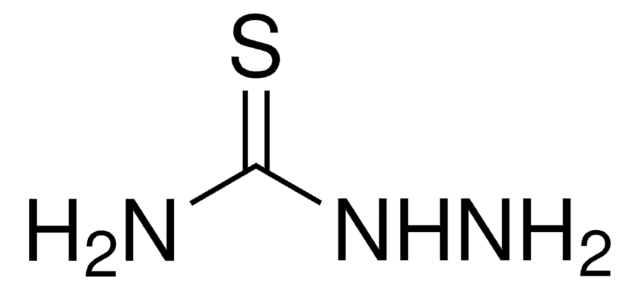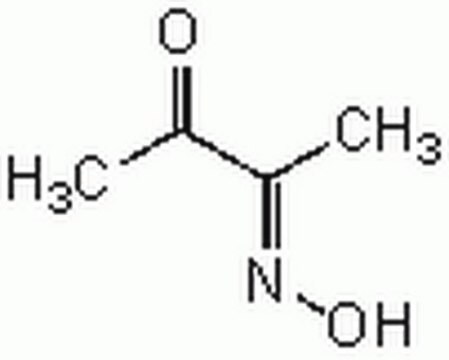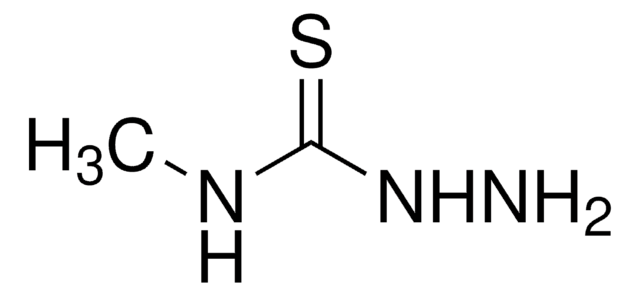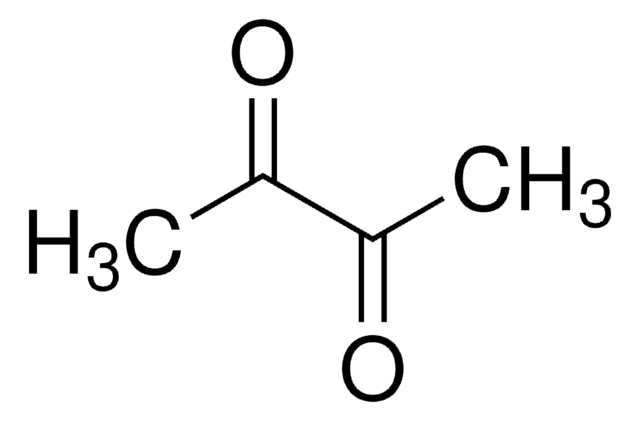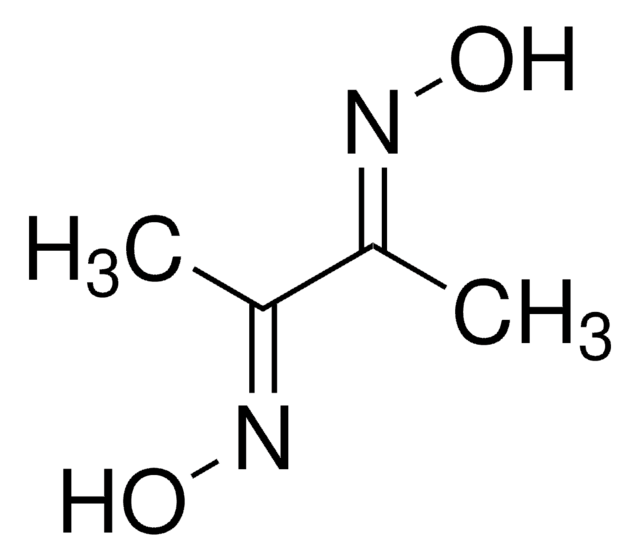31550
2,3-Butanedione monoxime
for spectrophotometric det. of urea, ≥99.0%
Synonym(s):
BDM, Biacetyl monoxime, Diacetyl monoxime
Sign Into View Organizational & Contract Pricing
All Photos(1)
About This Item
Linear Formula:
CH3C(=NOH)COCH3
CAS Number:
Molecular Weight:
101.10
Beilstein:
605582
EC Number:
MDL number:
UNSPSC Code:
41116105
PubChem Substance ID:
NACRES:
NA.21
Recommended Products
Quality Level
Assay
≥98.0% (N)
≥99.0%
form
solid
quality
for spectrophotometric det. of urea
technique(s)
UV/Vis spectroscopy: suitable
ign. residue
≤0.05% (as SO4)
bp
185-186 °C (lit.)
mp
75-76 °C
75-78 °C (lit.)
SMILES string
CC(=O)\C(C)=N\O
InChI
1S/C4H7NO2/c1-3(5-7)4(2)6/h7H,1-2H3/b5-3+
InChI key
FSEUPUDHEBLWJY-HWKANZROSA-N
Looking for similar products? Visit Product Comparison Guide
Related Categories
General description
2,3-Butanedione Monoxime (BDM) is also known as diacetyl monoxime, it is also a nucleophilic agent and it can dephosphorylates acetylcholinesterase poisoned with organophosphates. It is also a well-characterized, non-competitive inhibitor of skeletal muscle myosin-II, where it inhibits the chemical and motile activity.
Application
- A novel method to extend viability and functionality of living heart slices.: This research introduces a novel application of 2,3-Butanedione monoxime for prolonging the functional lifespan of cardiac tissue samples in experimental settings, offering insights into cardiac biology and potential therapeutic targets (Ross et al., 2023).
- Molecular Mechanisms of Deregulation of Muscle Contractility Caused by the R168H Mutation in TPM3 and Its Attenuation by Therapeutic Agents.: The study utilizes 2,3-Butanedione monoxime to investigate the molecular pathways affected by genetic mutations in muscle contractility, contributing to the understanding of muscle disorders and their management (Karpicheva et al., 2023).
- Generation of myocyte agonal Ca(2+) waves and contraction bands in perfused rat hearts following irreversible membrane permeabilisation.: Research employing 2,3-Butanedione monoxime investigates its role in inducing specific cellular events in cardiac cells under stress, highlighting its potential in studies of heart disease mechanisms and therapies (Morishita et al., 2023).
Analysis Note
Solubility:
0.5 g are completely soluble and give a clear solution in 10 mL water or also in 10 mL ethanol.
Sensitivity test:
0.05 mg urea in 3 mL water and 5 mL conc. HCl together with a 3% solution in water of diacetylmonoxime heated on a water bath for 10 minutes give a light yellow color.
0.5 g are completely soluble and give a clear solution in 10 mL water or also in 10 mL ethanol.
Sensitivity test:
0.05 mg urea in 3 mL water and 5 mL conc. HCl together with a 3% solution in water of diacetylmonoxime heated on a water bath for 10 minutes give a light yellow color.
Other Notes
Reagent for the colorimetric determination of urea and ureido-compounds; Spectrometric reagent for Co(II), Ni(II), Pd(II) and Re(VII); Reagent for the gravimetric determination of Ni(II)
Storage Class Code
11 - Combustible Solids
WGK
WGK 3
Flash Point(F)
Not applicable
Flash Point(C)
Not applicable
Personal Protective Equipment
dust mask type N95 (US), Eyeshields, Gloves
Choose from one of the most recent versions:
Already Own This Product?
Find documentation for the products that you have recently purchased in the Document Library.
Customers Also Viewed
Multiple Effects of 2, 3-Butanedione Monoxime.
Sellin LC and McArdle JJ/
Pharmacology & Toxicology, 74 (4-5), 305-313 (1994)
2, 3-Butanedione monoxime (BDM) as a myosin inhibitor.
Ostap EM.
Journal of Muscle Research and Cell Motility, 23 (4), 305-308 (2002)
W.B. Guenther
Analytical Letters, 12A, 1305-1305 (1979)
Improvements on the Prescott-Jones method for the colorimetric analysis of ureido compounds.
D B Shindler et al.
Analytical biochemistry, 97(2), 421-422 (1979-09-01)
Qing Lou et al.
American journal of physiology. Heart and circulatory physiology, 302(1), H262-H269 (2011-11-01)
Unlike other excitation-contraction uncouplers, blebbistatin has few electrophysiological side effects and has gained increasing acceptance as an excitation-contraction uncoupler in optical mapping experiments. However, the possible role of blebbistatin in ventricular arrhythmia has hitherto been unknown. Furthermore, experiments with blebbistatin
Our team of scientists has experience in all areas of research including Life Science, Material Science, Chemical Synthesis, Chromatography, Analytical and many others.
Contact Technical Service
